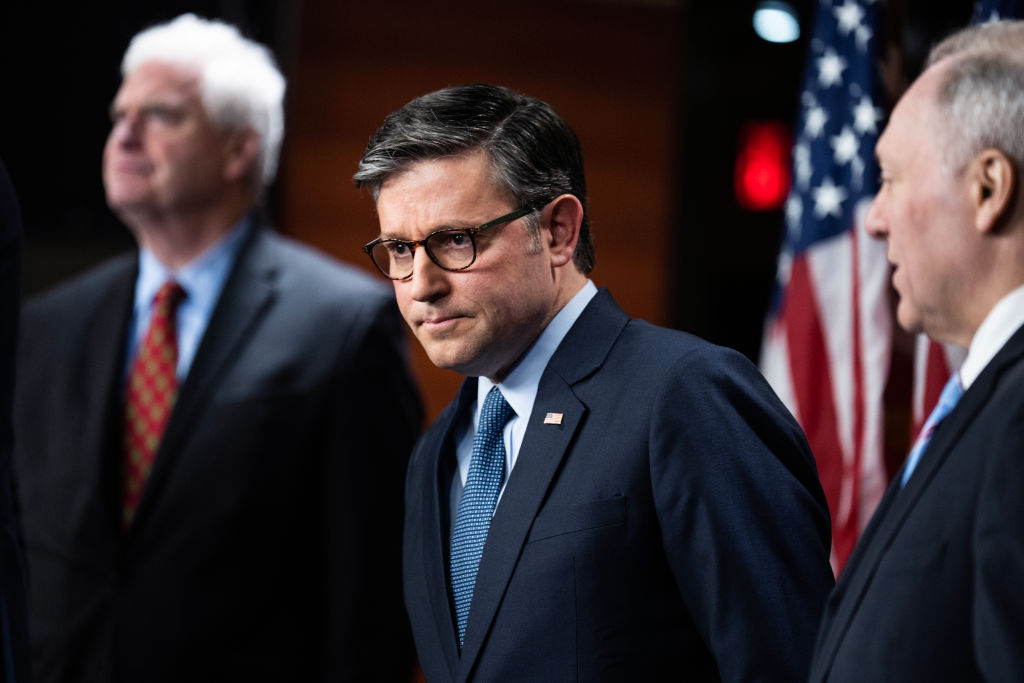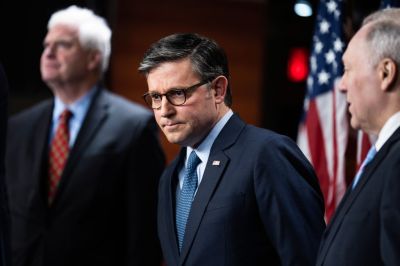Happy Wednesday! There’s no shortage of theories about what, exactly, the drone sightings over New Jersey are, but we’re pretty sure that they’re not Imperial TIE fighters.
Quick Hits: Today’s Top Stories
- Russian Gen. Igor Kirillov and his aide were killed Tuesday in Moscow by an explosive planted in a scooter. An official with the Ukrainian Security Service confirmed to the New York Times that Ukraine carried out the assassination. Kirillov, the commanding officer of Russia’s radioactive, chemical, and biological defense forces, was accused by Ukraine of allowing the “massive use of chemical weapons” on the battlefield. Ukrainian authorities had charged Kirillov on Monday with war crimes for the alleged use of chemical munitions in grenades and drones against Ukrainian forces.
- Israeli Prime Minister Benjamin Netanyahu visited newly Israeli-occupied territories in Syria on Tuesday, promising that Israeli military forces would stay in the country indefinitely. After visiting Mt. Hermon, 6 miles from Israeli positions in the Golan Heights, Netanyahu issued a statement that said Israeli troops would remain “until another arrangement is found that guarantees Israel’s security.” Israel has struck hundreds of weapons sites and military bases in Syria over the past several days, and captured several areas near its border with the country, following the fall of the Assad regime.
- New York State Supreme Court Judge Juan Merchan ruled Tuesday that President-elect Donald Trump’s May felony conviction should not be dismissed because of the Supreme Court’s ruling on presidential immunity earlier this year. Lawyers for Trump had argued that the guilty verdict, on 34 counts of falsifying business records, should be tossed out after the Supreme Court ruled in July that the president enjoyed broad immunity for official acts during his term. Merchan wrote in his 41-page decision that the evidence contested by Trump’s legal team did not relate to official presidential acts, and that “the People’s use of these acts as evidence of the decidedly personal acts of falsifying business records poses no danger of intrusion on the authority and function of the Executive Branch.”
- Luigi Mangione, the suspect arrested for the killing of UnitedHealthcare CEO Brian Thompson earlier this month, will be charged with murder as an act of terrorism, according to New York prosecutors, using a law passed after the 9/11 attacks. “This was a frightening, well-planned, targeted murder that was intended to cause shock and attention and intimidation,” said Manhattan District Attorney Alvin Bragg at a Tuesday press conference.
- The Federal Trade Commission (FTC) on Tuesday announced a rule banning “hidden fees,” or last-step add-ons to the listed price of hotel rooms and live-event tickets. The rule mandates that businesses must “clearly and conspicuously disclose the true total price inclusive of all mandatory fees.” FTC Chair Lina Khan said in a statement Tuesday that “people deserve to know up-front what they’re being asked to pay—without worrying that they’ll later be saddled with mysterious fees that they haven’t budgeted for and can’t avoid.”
- President-elect Donald Trump announced Tuesday that he is suing Iowa pollster Anne Selzer, the Des Moines Register, and its parent company, Gannett, for publishing polls showing Trump losing the state shortly before the election. Trump’s lawyers are alleging violations of the Iowa Consumer Fraud Act, which provides false advertising in the sale of merchandise, claims which are unlikely to hold up to judicial scrutiny.
Live Healthier, Longer

‘This Is Not an Omnibus’

A little after 6:30 p.m. Tuesday, congressional leaders dropped a 1,547-page stopgap spending bill to fund the government through March. We will not insult your intelligence—we haven’t read the whole thing. But neither has Congress.
When Republicans and Democrats in the House of Representatives gathered for their respective conference meetings earlier in the day to discuss a continuing resolution (CR)—a funding measure that lawmakers must approve by Friday night to avoid a government shutdown—there was one problem. There was no bill to discuss.
Though it was expected over the weekend, the text of the CR wasn’t released until Tuesday evening. Although party leaders were reasonably sure about the content of the bill during their caucus meetings, they didn’t have it in writing. House Speaker Mike Johnson had to sell the package to a disgruntled conference holding a narrow 219-211 majority that will be even smaller next year.
“The CR is coming together,” Johnson said at a press conference after the meeting. “Bipartisan work is ongoing. We’re almost there. We worked really hard to achieve consensus on a bill that responsibly funds the government until March [14] of next year.” But some of Johnson’s members were less than enthused with how ...
As a non-paying reader, you are receiving a truncated version of The Morning Dispatch. Our 1,272-word item on the latest government funding showdown is available in the members-only version of TMD.
Worth Your Time
- In The Atlantic, Caleb Gayle reported on one struggling town’s attempt at a comeback story: revitalizing the oldest African-American rodeo in the country, in Boley, Oklahoma. It’s a fascinating, hopeful tale that uncovers the hidden history of the black West: “In popular culture, the mélange of Westerns and cowboys and country music that is often called ‘Americana’ has been associated with a particular vision of liberty, in which the people most entitled to the possibilities of the West are white men who mastered the land and its inhabitants. But Boley and its rodeo helped create a countertradition—that of the Black West. In this tradition, Black people who had every reason to give up on America instead struck out for places like Boley and dictated the terms of their belonging.”
- The Economist took a look at the welcome yet puzzling decline in opioid deaths. America’s most deadly drug epidemic may finally be starting to peter out, and no one is quite sure why. “Data published by the Centres for Disease Control and Prevention, a government agency, suggests that nationally, deaths peaked around August last year. In the 12 months to July this year, there were 90,000 deaths—still an appalling total, but a reduction of around a sixth,” the report noted. An explanation could be related to law enforcement, the pandemic, and drug treatment. Or America may simply have reached a natural peak in the number of people willing to use fentanyl. “The idea that an epidemic can rise and then burn out, almost independently of the resources that flood into treatment or enforcement, is an uncomfortable one. But it has happened before: the European heroin epidemic of the 1980s and 1990s has not returned. And if this is what is happening with opioids now, the fall in deaths might, most promisingly, be sustained.”
Presented Without Comment
New York Times: A Weary Biden Heads for the Exit
Mr. Biden these days barely engages with the reporters who follow him everywhere. He has held no news conferences and conducted no interviews with the traditional news media since the election, though he has done some podcasts. His only reply to shouted questions from journalists during his entire Africa trip added up to 14 words. In South America, it was just a single word.
Also Presented Without Comment
Bloomberg: Navy Wasted $2 Billion to Maintain Older Guided Missile Cruisers, GAO Says
The US Navy mismanaged a program to keep in service 11 older cruisers designed primarily for air defense, “wasting” nearly $2 billion in the process and failing to hold contractors accountable for shoddy work on a broad scale, according to an audit released Tuesday.
…
“By not extending the service lives of any of the 11 cruisers as planned,” for at least five years, the Navy “will lose 55 years of operational cruisers, compared to its original plans,” it said.
In the Zeitgeist
Wax on, wax off: There’s a new Karate Kid movie, starring Jackie Chan, in the works.
Toeing the Company Line
- In the newsletters: Nick Catoggio argued (🔒) that threats and shakedowns will be the political currency of Trump’s second term.
- On the podcasts: Jonah Goldberg is joined by Greg Lukianoff on The Remnant to discuss all things free speech.
- On the site: Kevin Carroll explains what’s happening with all the drones in New Jersey, John Gustavsson argues that Europe should not be accepting refugees from Syria, and Jonah Goldberg breaks down why presidents don’t affect the economy as much as everyone thinks.









